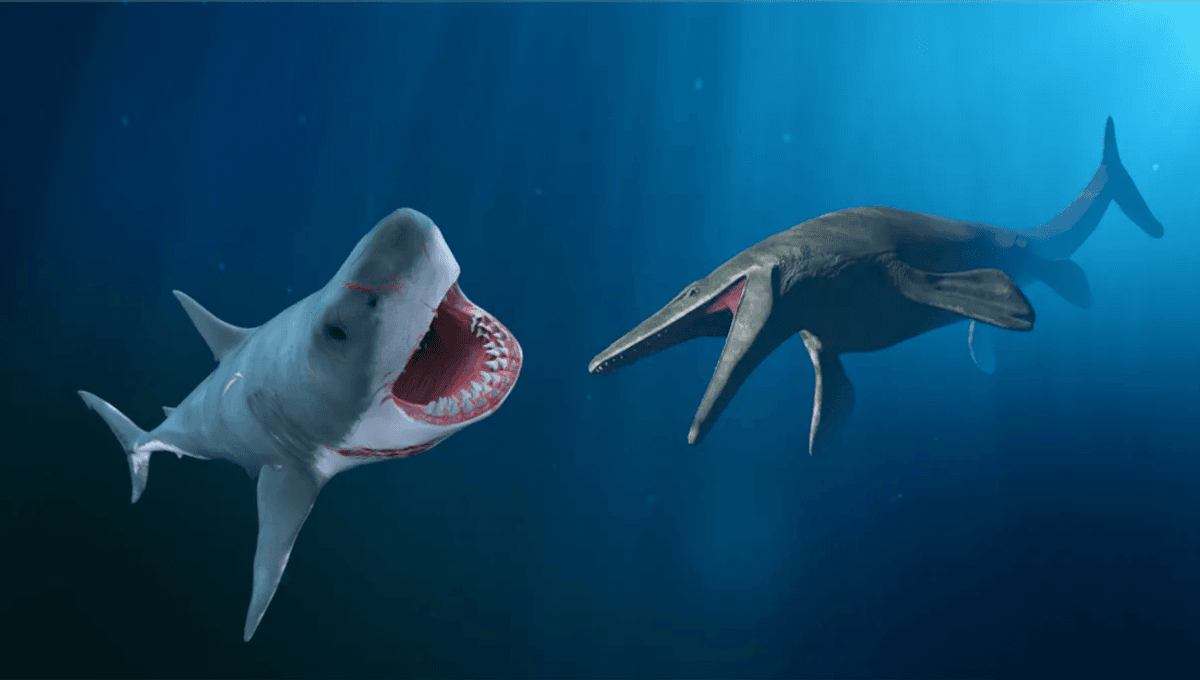
Megalodon vs Mosasaurus, it’s a tough call. This hypothetical conflict takes place below the waves, where the currents of time merge to pit two of nature’s ancient aquatic titans against one another. While these giant prehistoric monstrosities both ruled different epochs in Earth’s history, the question of who would emerge victorious in a fight has plagued humanity for centuries (okay, maybe a few years at least). So let’s settle this once and for all.
The Contenders
Mosasaurus, “lizard of the Meuse River”, is an extinct species of marine lizard that lived between 82 to 66 million years ago during the Late Cretaceous period. With its elongated body, powerful jaws, and formidable teeth, the Mosasaurus was undoubtedly a top predator in its ecosystem.
This enormous reptile, which could grow to between 11 to 17 meters (36 to 56 feet) in length and had a large distribution across the world’s oceans, but seems to have been most abundant in the shallower waters around Europe. This means that the aquatic reptile was unlikely to be a deep diver, preferring instead to hunt and maneuver near the surface where most of its prey lived.
Mosasaurus was equipped with strong flippers for propulsion and a tail for efficient swimming and is possibly capable of reaching speeds of around 48 kilometers per hour (30 miles per hour) in short bursts.
In terms of weaponry, Mosasaurus was armed with around 40-50 teeth that were about 25-30 mm (0.98 to 1.18 inches) long. It was probably capable of exerting around 13,000 to 16,000 pounds per square inch (psi) of bite force. For comparison, the saltwater crocodiles of today are capable of achieving about 3,700 psi.
In contrast, the Megalodon, a massive mackerel shark, dominated the oceans around 3.6 to 23 million years ago during the Miocene and Pliocene epochs. It is often considered one of the largest predators to have ever existed. With lengths estimated to reach up to an awe-inspiring 18.3 meters (60 feet) or more, the Megalodon’s enormous size gave it an edge in terms of sheer mass and power. Armed with rows of serrated teeth that could be up to 18 centimeters (7 inches) long, the shark was capable of crushing bone and tearing through flesh with a whopping 40,000 psi bite. This ancient shark was undoubtedly an apex predator, likely feeding on marine mammals such as whales.
Megalodon was found across the world and is thought to have sustained an average cruising speed of about 4.8 kilometers per hour (3 miles per hour), but was likely capable of rapid bursts of speed, much like Great White sharks today. It is currently unclear what its maximum speed could have been. But this was a titanic creature, which had an estimated mass of around 61.6 metric tons, which is as heavy as around 10 African elephants, or around 34 Great Whites.
The fight
In a hypothetical face-off, the respective attributes of these creatures would play an important part in determining the outcome. The Mosasaurus’s agility and reptilian armor could potentially provide an advantage in maneuverability and defense against the Megalodon’s powerful bites. On the other hand, Megalodon’s massive size and immense bite force would make it a formidable opponent – one well-placed bite could be enough to bring the fight to a quick and bloody end.
However, the chosen arena is also an important factor. Megalodons are heftier and less mobile than Mosasaurus who had evolved to utilize shallower waters. This might give the reptile the upper hand, but equally, the situation would be reversed if it found itself in deeper open water against the behemoth shark.
So how do we decide the winner? Well, it may come down to sheer attitude. Megalodon was an apex predator that had no rivals and nothing that posed a physical threat to its supremacy. It was peerless and, given its diet of marine mammals like whales, it was likely more experienced with facing larger prey. Mosasaurus, in contrast, had to develop some defensive strategies to avoid conflict with other potential rivals that existed during its time on Earth, so may have been a more circumspect hunter. Unfortunately, this may have given the prehistoric shark the edge in a hypothetical conflict, as it would have likely been more aggressive than its competitor. And, armed with that incredible bite, the fight we have waited millions of years to see may have been a short one.
Ultimately, we shall never really know the truth of this epic encounter as the worlds of these ancient leviathans never crossed over. Alas, we will have to rely on our imaginations to settle this one.
Source Link: Megalodon Vs Mosasaurus: Who Would Win In A Fight?